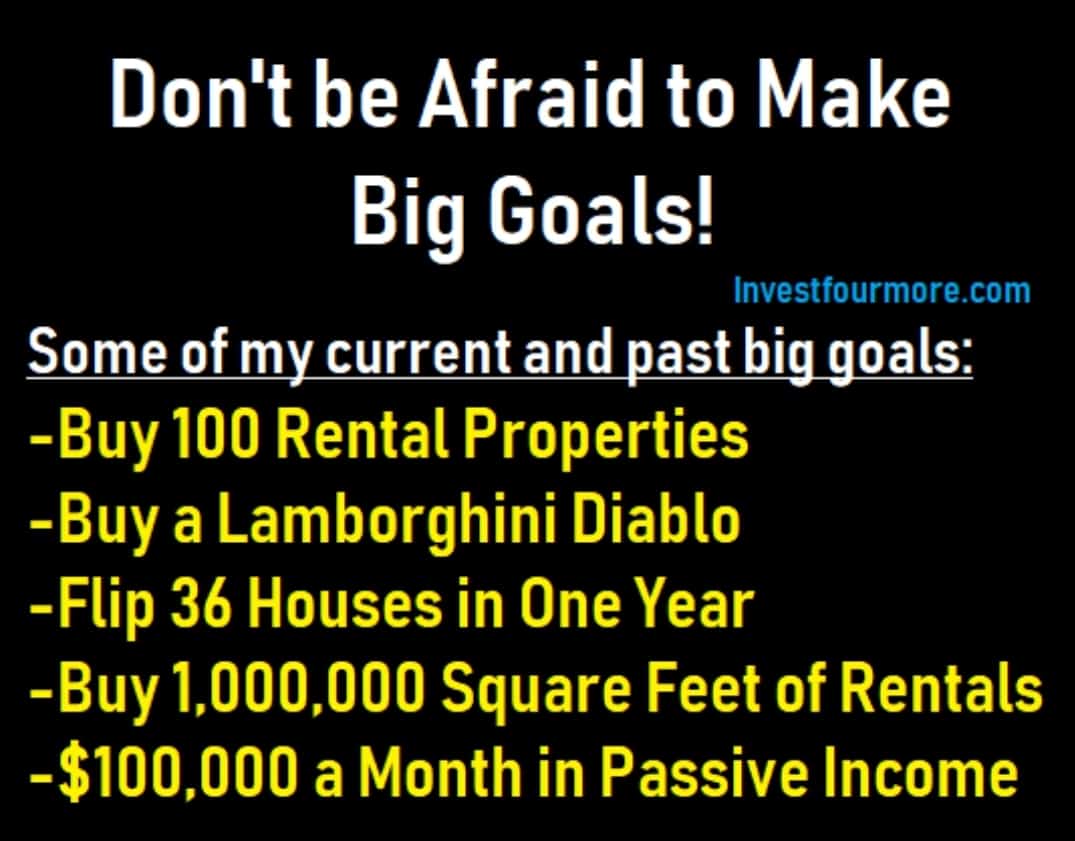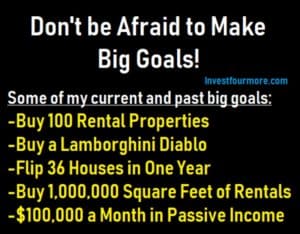
How to Set Great Goals for Real Estate

Why do you need to set goals?
I think we all want to be successful, but many of us don’t know exactly what success means to us. Do you want money, free time, vacations, stuff, or security? If you don’t know the exact answers to these questions, it will be very hard to become successful. If you say you just want to be happy—what is happy? Is happy being able to quit your job and travel the world, or is it being able to buy a Lamborghini? You have to figure out what you want in life, and you have to define it in writing. Once you know exactly where you want to go in life, it becomes much easier to get there.
Why do goals need to be written to be effective?
Some people believe thinking about their goals is good enough, but it is not. The problem is people forget things and forget things often. If you have 20 different things going on in your life with work and your family, how will you remember to think about your goals? You may not even remember what your goals are!
Writing your goals helps you remember what they are and reminds you of them. If I don’t have my goals written down, I lose track of them, and I don’t think about them. Writing your goals down also solidifies them in your mind. The actual act of writing a goal down helps you visualize it and helps imprint it in your brain. The more you think about your goals, the more you write them down, the more you see them or listen to them, the better chance you have of reaching those goals.
How do you remember to look at your goals?
Humans are creatures of habit, and the more we do something, the better chance we have of continuing to do it. After you write your goals down, it does not do you any good to put those goals away and never look at them again. Set aside a time you will review your goals and schedule that time like you would an appointment. It is best to review your most-important goals daily, but you should be reviewing all of your goals on a weekly basis.
I used to record my most important goals on my phone and listen to them every day. On my way to work, I would play my goals and my dream story (a story I wrote about my perfect life in five years). I like to record my goals with a long break in between the goals so that I can visualize and think about the goals while I am driving. I also cut out a big goal and plaster it in plain sight on my fridge or garage door.
Now I write my goals on whiteboards and leave them in plain sight where I can see them every day in my office. I also share my goals with my team so that I am accountable and they keep me on track. As you can see from my other goal articles, I also share them online and on Instagram, which keeps me even more accountable!
Below is a video of the goals I made last year.
Should your goals be specific?
Any written goal is a great start, but there are ways to make your goals as effective as possible. Goals need to tell you what you want, when you want it and should hold you accountable. A weak goal would be:
I want to own a Porsche
The problem with this goal is it is way too vague and it does not have any accountability. The goal says you want to own a Porsche. It doesn’t say you will have one or you will buy one. There is no date that you will buy the Porsche nor does it mention what kind of Porsche. If you want a 2017 911 Turbo, but end up with a 2003 Cayenne SUV, you may not be very happy! A good goal would be:
I will own a black 2017 Porsche 911 Turbo by January 2022 or sooner
This goal is very specific for what you want; it allows you to visualize the goal which is very important. It also has a date for when you will buy it to hold you accountable. Notice I used the words or sooner. You don’t want to limit yourself to buying that car in 2022 if you are able to comfortably do so sooner.
If you are not dead set on a Porsche 911 turbo, you could also say:
I will own a black Porsche 911 turbo or something better by January of 2022 or sooner.
What should your goals consist of?
A lot of people like to make a few really big goals, but you can make big or small goals. When I took Jack Canfield coaching a while back, I was instructed to write down 100 goals in a set period of time. It was hard to come up with that many goals, and I think I stopped at 80. That exercise made me come up with big goals and small goals. It was fun to think of very easy goals that I had been putting off for months or even years but that I could knock off my list. I also came up with some big goals and a few crazy goals. The trick was to think about what I really wanted in life and limit myself to what I thought I could do or afford now.
Here are some of the things I made goals about:
- Money made in one year
- Net worth by a certain date
- Vacations—where, when
- Special events you want to attend—Super Bowl, concerts, Kentucky Derby, etc
- People you want to meet
- When you want to retire
- Where you want to live
- What your house will be like
- What cars you want
- How much you will give to charity
- What charities you will volunteer for
- What is your perfect job
- Businesses you want to start
- Relationships you want to create or make better
- Small things that you need to do but keep forgetting about
How realistic should your goals be?
There are many opinions about how big and outrageous goals should be. Some feel you should not have goals that are too big because it may not be realistic and therefore less effective. Others feel you must have big goals to challenge yourself to do better than you ever thought you could.
I have a goal to buy 100 rental houses, which is a big goal. I like big goals because I believe they make us perform better than if we had small realistic goals. The trick is you do have to have belief in your goal. It will be very hard for me to buy 100 rental properties, but I also thought it would be very hard to buy a Lamborghini, and I did that five years ago.
How can you believe in goals that seem too big?
If you make big goals, you need to convince yourself they are possible. How do you make yourself believe in something that seems impossible? It’s simple: you never know what the future holds for you. How can you think something is impossible when you don’t know what will happen. Now, if you make a goal that you want to fly like a bird with just your arms, that may be impossible. But if you set goals that are physically possible like triple your income, that is not impossible. There is opportunity all around. You have to recognize it and go out and get it.
If you think you aren’t lucky enough to be rich or weren’t born into money, you have to change your attitude immediately. The truth is most millionaires and billionaires were not born into money—they made it themselves. The person who makes the most money usually does not invent something or create an incredible technology. The rich figure out how to do existing things better or more efficient. You don’t have to reinvent the wheel to make it big.
In fact, most inventors don’t make that much money because they don’t know how to bring their product to the market. Andrew Carnegie was a steel magnate and the richest person in the world at one time. He was a Scottish immigrant with no money to his name when he came to the US. He had no idea how to make steel, but he started working in a steel mill and learned the business. He hired great people who knew about steel, and he let them grow the business for him. He was known for working few hours and for taking the entire summer off to go back to Scotland. You don’t have to be a genius or sacrifice your life to make it big.
If you don’t want to start with huge goals, at least make sure your goals challenge you and will make you work hard to reach them.
What if you don’t reach your goals? Are you a failure?
People like to claim they can’t make big goals because they might fail and then feel bad. I don’t believe in failure. You only fail if you give up and stop trying.
Goals also change. There is no rule that says you can’t change a goal after you write it down. You may find a new goal much more fulfilling and exciting than your current goals. That doesn’t mean you can change a goal every time you’re frustrated or run into a roadblock.
I had a goal to build a loft in my old house. I worked for months to figure out a way to build that loft, and nothing would work because the house had engineered trusses and it didn’t make sense to rebuild the entire roof. Then, my wife happened to find a better house with a bigger garage and a loft! The solution was not building a loft but buying a new house. I found a better goal to replace the old goal.
If you have a big goal that you don’t reach, you did not fail. The goal is meant to help you succeed and do better in life. Even if you set a big goal and don’t reach it, you more than likely got much further in your pursuit of that goal than if you had set a smaller, more-manageable goal. The problem with small goals is they can be accomplished easily. If you have a yearly income goal, when that goal is accomplished, you will relax and stop working hard. A big goal will keep you working hard throughout the year and push you to find new ways to do things.
Accomplishing a small goal may be worse for you than not reaching a big goal.
What is the next step?
Writing your goals is the first step to making your goals become a reality. Once they are written, you have to start taking action. If you have 100 goals, you can’t write a detailed plan for each goal. But you can take your top three or top five goals and make a detailed plan for them. A detailed plan involves writing down what you have to do to accomplish the goal, including:
- Who you need help from.
- How you will get their help.
- What education you need.
- What resources will you need.
- How will you get those resources.
- What tasks will you do every month, every week and every day to accomplish your goal.
Once you have a plan for your goal and actions you can take to reach your goal, those big goals won’t seem so big anymore. You may find yourself revising your big goals because you are accomplishing them faster than you ever imagined. I have accomplished many of the 100 goals I wrote down. Some of those are small goals and some are very big goals. Some of the goals I accomplished ahead of schedule and some took me a little more time than I hoped. I know one thing for sure; I would not have accomplished half of what I did, without written goals and a plan to accomplish them.
Conclusion
Setting goals is vitally important to success. You cannot set goals once a year, forget about them, and then get mad that you did not accomplish any of them. You need to take your time setting your goals, write them down, review your goals, and make a detailed plan on how you will reach them, or try to reach them!
Below is a list of my goal articles:
I will have an article for 2020 coming soon on those goals and how I did in 2019.
Join me on The $100M Mission!
Get exclusive updates as I work to own $100M real estate by 2030 in today's market. Whether you're just starting out or already investing, you'll get actionable insights from my real-world deals and setbacks.
Plus, I'll help you set and achieve your own ambitious goals. Transform your financial future - subscribe now for weekly updates.
Together, we'll prove that massive success in real estate is still possible.

